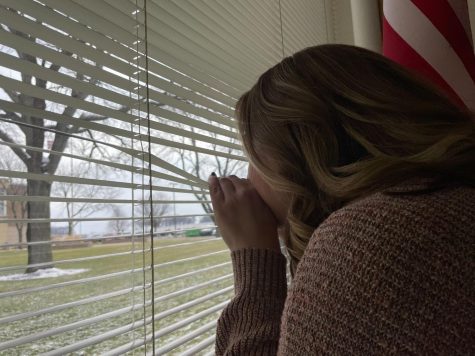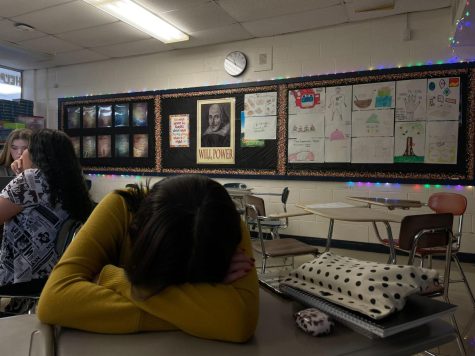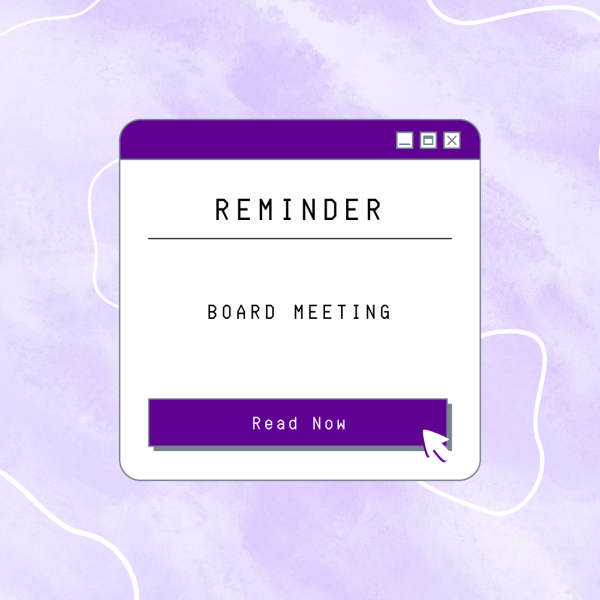Seasonal affective disorder and the impacts of weather on mood
Photo By Zoe Gannon
The trees are bare and the sun sets near the entrance of Kaneland High School. Parents have picked up their kids from their after-school activities and many students are ready to go home and sleep.
Have you ever found yourself feeling more sad, aggressive or happy during certain times of the year? Many people have experienced these troubles during different seasons. Some feel more aggressive or easily irritable during warmer months, while others find themselves feeling isolated and depressed during colder months. Everyone’s feelings are very different, and not all of this information could be applied to you, but seasonal affective disorder (SAD) is a very real thing.
Research done by psychologist John M. Grohol shows that many people can be affected by SAD. Grohol has researched how people’s moods can be affected differently during certain seasons.
“Higher temperatures were associated with an increase in a person’s negative feelings, feelings such as being more irritable, distressed or jittery,” Grohol said.
This could be because heat plays a role in how someone feels. If someone is a fan of warm temperatures, then they may feel happier during summer and spring months instead of feeling more upset, while others who do not like the heat may get upset and uncomfortable because of physical factors like sweat, sickness and bug bites that often happen during warmer months. Everyone’s feelings are very different, and this doesn’t mean that the weather will always affect how you are feeling.
Counselor at Wellspring Center for Counseling in Sycamore Megan Bennett has had some clients who have experienced similar troubles to what Grohol described.
“I have a couple of clients that go through [SAD] very often. It’s actually not a diagnosis. You can’t diagnose somebody through it. It’s just something that happens, the weather causes the mood to affect how you’re doing,” Bennett said.
It is common for people to get affected by the weather because of their personal preference for temperature. Some misconceptions about SAD are that it only takes place during the winter months, but Bennett disagrees.

“It [can happen during] any season. Winter depression is usually the most common because it’s dark and gloomy. That usually puts people in a state of depression. However, if you’re a person who likes the dark and cold and then spring comes along and it’s sunny, that could put you into a depressive state,” Bennett said.
Many people feel like isolating themselves during the colder months because they do not want to go out in the cold.
Sophomore Ava Lange has had her own experiences with this feeling.
“I didn’t want to go outside because it was cold and gloomy. I just want to lay in bed covered in blankets [with] a warm drink to keep me cozy,” Lange said.
Not everyone gets affected by the weather, though. Some people may just get affected by the time of year and what is going on in their lives. When it is nearing summer, teachers see a difference in behavior from some of their students.
“Kids get so easily distracted in the spring because they are thinking about summer and having a hard time staying focused,” English teacher Jennifer Sayasane said.
Junior Mallory Nitsche also agrees and has felt the same way during the springtime.
“I feel like everyone is just looking forward to summer, so they get distracted and behind on school work and then are really stressed out when the end of the year comes,” Nitsche said.
The different seasons could also be associated with different parts of your life. Many people experience lifestyle changes from season to season. This includes different sports, jobs and friends.

These changes could also play a role in why people’s feelings get affected from month to month rather than due to the weather.
Nitsche has done soccer throughout the year for her club. She has noticed a difference between indoor and outdoor seasons in the way she played and felt.
“I think that the change in the atmosphere of sports affects how I am feeling. I feel like indoor soccer just feels stuffy and tiring because of how dark it gets in the winter. I feel a lack of energy when the indoor season starts because I [want] to just lay in bed and snuggle up,” Nitsche said.
Although many people do experience mood changes based on the season, that doesn’t mean everybody does. Everyone’s feelings are different, and all feelings are valid.

Name: Zoe Gannon
Position: Co-Sports and Activities Executive and Cartoon Manager.
Graduation year: 2025
A few sentences...









